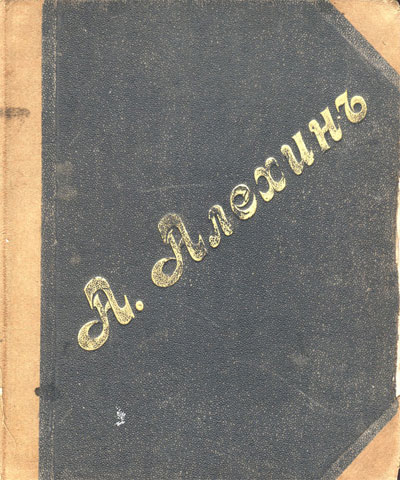In New in Chess, 2012 No.8 there is a memoir by Alekhine’s classmate, Georgy Rimsky-Korsakov. The six-page article is introduced by Genna Sosonko.
Alekhine in 1904 was 12-years old, already playing correspondence chess for at least two years.
“Completely immersed in his chess work, even in Divinity or French lessons, when all the students except for those who sat like a screen in the front row were indulging in some pleasant activity such as playing draughts, dominoes or even cards, or reading about the adventures of Sherlock Holmes, or just dozing peacefully, Alekhine alone could not be distracted from his chess labours.
He was so removed from his surroundings that he wasn’t always fully aware of where he was or what the lesson was about. Occasionally he would suddenly jump up from his game. The class went quiet and waited tensely to see what would happen next. Standing up for a moment with a confused look on this face and twirling his reddish forelock, Alekhine would let out a happy ‘Aha!’, quickly grab a pen and write down the move he had thought of.”
His education continued, going from the Polivanov Gymnasium in Moscow to the Institute of Law in St. Petersburg in 1911 and that is where the memoir ends.
A very interesting read. I could not pronounce the name Alekhine properly when I was a teen and was happy to find that one of his professors, Father Rozanov, called him ‘Olyokhin’, with the stress on the ‘yo’, to which the future world champion replied “My surname, father, is Alekhine, not Olyokhin.”
If the young reader is now not sure how to pronounce the name either – then I am 100% with him!
Alekhine in 1904 was 12-years old, already playing correspondence chess for at least two years.
“Completely immersed in his chess work, even in Divinity or French lessons, when all the students except for those who sat like a screen in the front row were indulging in some pleasant activity such as playing draughts, dominoes or even cards, or reading about the adventures of Sherlock Holmes, or just dozing peacefully, Alekhine alone could not be distracted from his chess labours.
He was so removed from his surroundings that he wasn’t always fully aware of where he was or what the lesson was about. Occasionally he would suddenly jump up from his game. The class went quiet and waited tensely to see what would happen next. Standing up for a moment with a confused look on this face and twirling his reddish forelock, Alekhine would let out a happy ‘Aha!’, quickly grab a pen and write down the move he had thought of.”
His education continued, going from the Polivanov Gymnasium in Moscow to the Institute of Law in St. Petersburg in 1911 and that is where the memoir ends.
A very interesting read. I could not pronounce the name Alekhine properly when I was a teen and was happy to find that one of his professors, Father Rozanov, called him ‘Olyokhin’, with the stress on the ‘yo’, to which the future world champion replied “My surname, father, is Alekhine, not Olyokhin.”
If the young reader is now not sure how to pronounce the name either – then I am 100% with him!





Comment